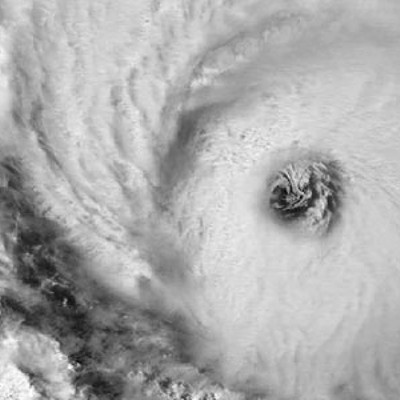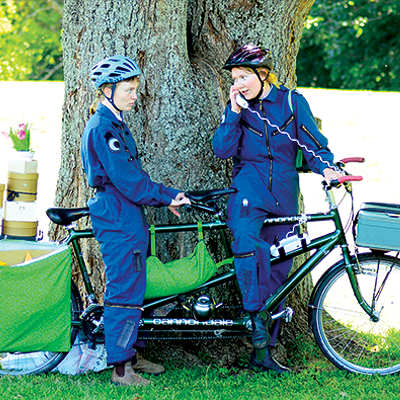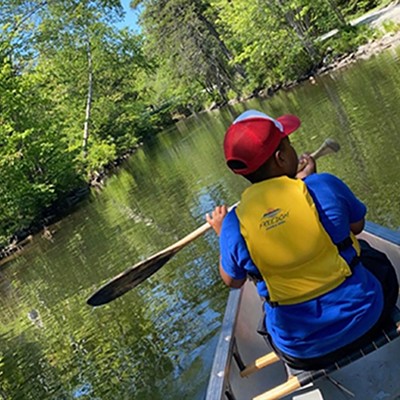Shakeel Rehemtulla has done some unsavoury jobs. The NSCAD student and local designer once scooped out fertilizer from a huge steamy vat filled with a concoction of long-fermented yogurt, compost and manure. Along with girlfriend Carey Jernigan, they spent a week last year working on an aloe and date farm in Gujarat, India as volunteers with WWOOF---World Wide Opportunities on Organic Farms or Willing Workers on Organic Farms.
Their first days there were spent transporting the fertilizer from a truck to the date trees. "I actually had poop in my eye," laughs Rehemtulla. The pair, both in their mid-20s, did not feel they had a positive experience; not because of the unpleasant chores but because this farm was not a right fit for what they were looking for. The farm was large, with 15 hired employees and four WWOOFers.
Not all of their WWOOFing experiences were horrible, though. In 2002, the couple volunteered at a smaller vegetable farm on Salt Spring Island, in the Straight of Georgia off BC's coast. It was a completely different scenario, and what was meant to be a two-week stay stretched into a three-month sojourn. Despite the experience in India, Jernigan strongly recommends trying out WWOOFing. "You learn so much from the farmers. We were eating better than we ever had before. There was so much delicious organic food and great people."
The couple worked about six hours a day---volunteers are expected to work between four and seven hours per day---learning everything about organic farming, from seeding and hoeing to selling produce at the local farmers' market. "I had no clue about farming . I grew up with a vegetable garden but hadn't paid much attention to that. After being on the farm, suddenly everything made sense," says Jernigan. The point of WWOOF is to have no money change hands, so volunteers do not receive payment, only room and board. They are only responsible for their travel to the farm and any other spending money.
WWOOF started in the United Kingdom in 1971 as a cultural exchange. It allowed interested volunteers to travel to organic farms and help out in exchange for accommodation and meals. John Vanden Heuvel started WWOOF Canada in Nova Scotia in the mid-'80s. He had been involved with Katimavik, the youth volunteer program across Canada, and liked the idea of volunteering. "WWOOF is primarily help for organic farmers and learning about food in our society...but it's also evolved into being a cultural exchange," says Heuvel. The program does virtually no advertising and has grown solely through sharing word-of-mouth experiences. There are over 2,000 volunteers a year, with participants from all over the world. There is also an inter-Canadian cultural exchange with about half the volunteers travelling within the country.
The way WWOOF works is simple. You pay a fee---the amount depending on where in the world you want to volunteer. For Canada, the cost is $40 per person ($80 for a couple). Once the fee is processed, you are sent a booklet that contains listings of all the WWOOF hosts in the country. There are brief descriptions of the farms and their contact information. If you are interested in staying in Canada, there are over 600 farms in the country and over 40 in Nova Scotia alone.
Kate and Brooke Oland have been WWOOF hosts for three years and thoroughly enjoy it. They run a small subsistence farm where they grow vegetables and raise cattle, goats and chickens. Of all the volunteers they've had over the years, they can only recall one negative experience. To avoid any surprises, Kate emphasizes the importance of communication before and during a WWOOFing period. She strongly encourages some front-end contact prior to showing up, and finding out information like what sort of work you'll be doing or what accommodations are like. "It saves difficulty down the road," says Kate. "It works best if expectations are straight up."
If you decide to try WWOOFing, keep in mind a few things. It is a cultural exchange but also a knowledge exchange. It's beneficial if you are keen to learn, share and pitch in. The emphasis of WWOOF is on organics, but there are a wide variety of hosts and opportunities. If you don't want to work on a farm, there are other options. Perhaps cheese making is more up your alley. Take the time to look through the booklet to find the kind of environment and experience you are seeking.
Accommodations do vary, depending on the host. It can be a bed and breakfast-like setting or a hay bed in the barn. Jernigan's and Rehemtulla's small cabin on Salt Spring Island had an old "No Nukes" sign from the '60s with an outdoor shower and was located in the middle of a wildflower field. The Olands offer a glassed-in sun porch connected to the house with its own entrance. Again, asking beforehand would help avoid nasty surprises.
If you find you're not having the kind of experience you want, be sure to communicate with the hosts. It could be that you need to give it time or at least make your feelings clear. Most hosts expect you to stay a week or two. It takes them awhile to train you and for you to adjust. Rehemtulla offers this advice: "If you like it, you like it. If you don't, move on. Don't let it discourage you. Find what works for you."
WWOOFing is a great way to travel---especially if you are interested in more than just going somewhere and seeing the usual tourist sites. Because you are staying with a host, you are meeting people who are actually from the region, immersing in their lives and their work. For those who want to learn more about organic farming, whether it's where food comes from or how to make a community sustainable, WWOOF is an excellent program to acquire those skills.
The important thing with WWOOFing is to keep an open mind and a willingness to learn. "With anything you try, your appreciation for it increases," says Jernigan. "If you try organic farming, suddenly you realize what an art it is and how important it is, how it's not given the respect it deserves...my appreciation for farming is really different now."
Michelle Kay is a freelance writer in Halifax. Unfortunately she lives in an apartment building and does not have a garden. She plans to have a fun summer anyway.














